#ch 1046
Text
I feel like with Gear 5 comin up in the anime I should reiterate this.
Luffy only feels like Joyboy to Zunesha. “As if you’re right there.” and “we should put our faith in this boy.”
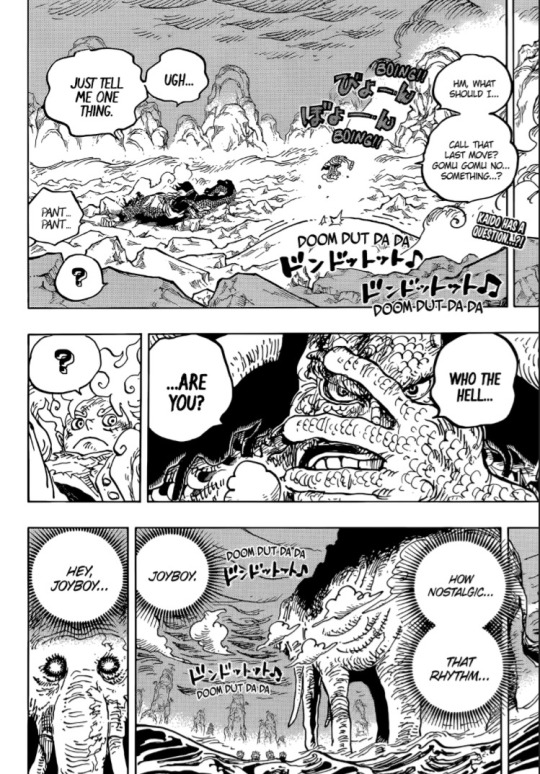
If it was actually Joyboy she wouldn’t have said “should and this boy” she’d have just said Joyboy again. It seems the entire fandom is missing this.
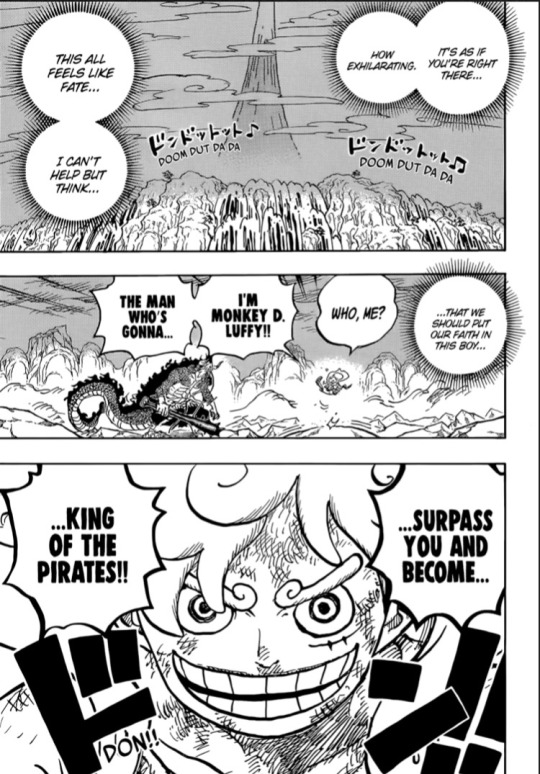
Luffy confirms it himself. Nobody is “taking over” his body. Hes not a reincarnation or being controlled by the will of his devil fruit. He’s not actually Joyboy or Nika.
HES FUCKIN MONKEY D. LUFFY THE MAN WHOS GONNA BE KING OF THE GOD DAMN PIRATES!!!!
76 notes
·
View notes
Photo

The fire’s been a big problem so this is immensely needed right now!
8 notes
·
View notes
Text
When ch 1044 and 1045 were released and all the chaos was unleashed, I remember having a very obvious question
"How come the power of human human no mi: model Nika is connected to rubber?"

How is a gomu gomu fruit's awakening the power to turn imagination into reality?
I mean... This awakening grants the user freedom, not just of spirit but freedom of how to use power too. Luffy's ability to manipulate reality while in gear 5 seems to show that.

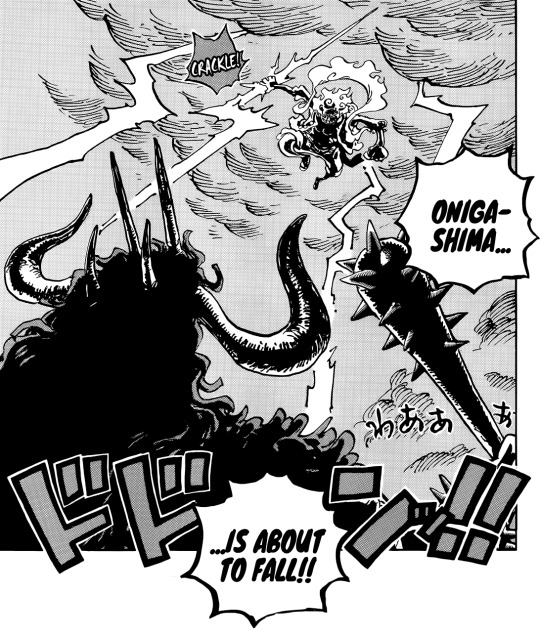
So??? Why rubber? Why does the fruit give the user a rubber-like body? What does that have to do with anything?
I was totally not re reading Skypiea when I noticed this.
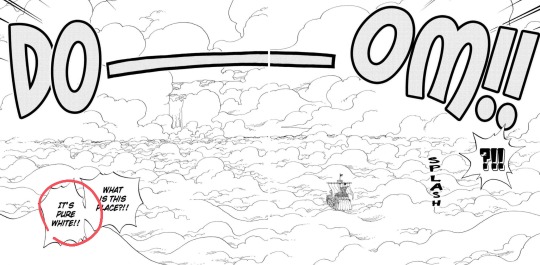
Of course it's white they're in a cloud sky instead of a water ocean, but it's the fact that they use "pure white". White would've been enough to get the point across, right?
Guess where else have we seen that exact expression!? Oda's drafts of Gear 5!!
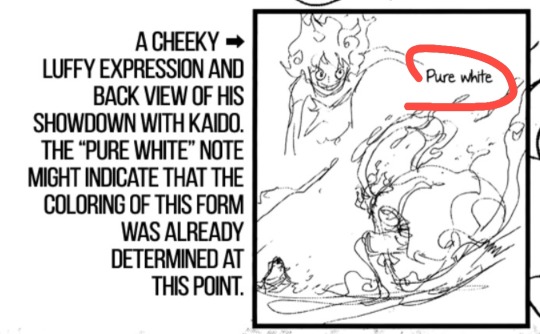
And the chapter after that? Guess what?!
We learn island clouds in Skypiea bounce just like rubber.
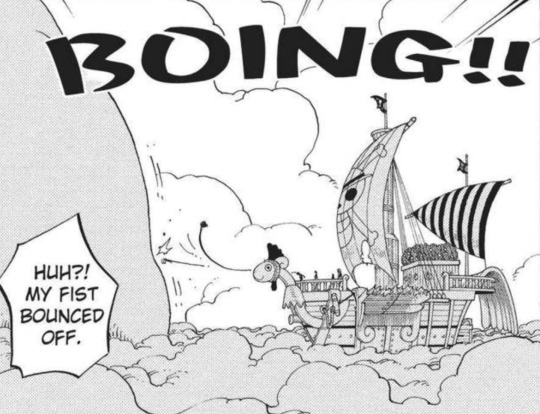
There's no need for Oda to make them bounce, but they do! Exactly like when Luffy turns the environment around him to rubber due to the awakening.
Let's not forget that Skypiea is where we first hear about the "Sun God" and we see Luffy's sirouette resembling the "Sun God Nika" transformation.

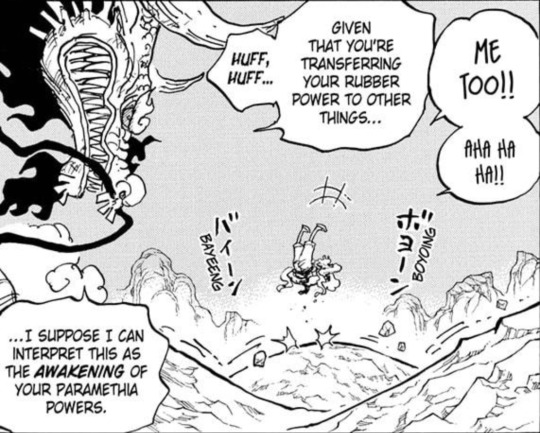
So would it be insane to think whatever Luffy has going on during his gear 5 is clouds?!! More specifically island clouds just like the ones found in sky islands.
Think about it.
Rubber was unknown to the people in Skypiea, and sea clouds/island clouds don't survive in the blue sea under natural conditions. Most likely 99% of the blue sea population has no idea what an island cloud is or what their properties are.
For all intents and purposes rubber was the best description blue sea people could give to the power of the fruit. If the fruit hasn't awaken in 800 years, it means no one has seen that transformation (which clearly is not just a “rubber fruit” awakening) EVER?! since the end of the void history gap. You would have no way of knowing. You would just think it’s rubber.
Now what does clouds have to do with the Sun God?
Well other than "they're in the sky" I'm not sure 😂 but someone that dreams a lot is said "to have their head in the clouds". The same way imagination and thoughts in manga are depicted with a floating cloud above the character's head.
It seems to be a perfect physical and symbolic representation of dreams! That's the theme of skypiea and the true pinnacle of piracy - dreams and freedom. It’s what the whole story is about!
#opspoilers#op spoilers#opwmspoilers#opmeta#luffy#human human no mi model nika#It's fucking clouds isn't it???#I've been staring at the void for too long trying to articulate a decent explanation of my afternoon discovery#And don't get me started on how dials have to be ancient tech from the ancestors of the skypeians#and possibly even from THE ancient kingdom!!#the way pagaya and Gan fall talk about them... It just feels like it and that they don't know how to make dials anymore#Plus skypieans were from the moon#and super technological advanced. They has mecha and all!#And vegapunk has managed to make sea and island clouds in egghead#They can definitely be#manipulated and maybe even man-made#Also pyrobloin!!! It's a component from both Kairoseki and cloud islands!#I have too many thoughts running through my mind.#Maybe another day ill post about some of the other stuff but for now CLOUDS?!!#I needed to get that out bc it's so stupid but... One Piece is stupid?!! Right???#I think I might've just gone insane#§mine#ch: 1044#ch: 1046#ch: 1061#ch: 237#ch: 238#ch: 1053.4#§optr#§opmta
97 notes
·
View notes
Text
Bluey Mom (Ch. 3)

Ship: Alex Blake/Emily Prentiss
Summary: Today's episode of Bluey Mom is called Superheroes.
(The adventures of Emily Prentiss as she navigates running the BAU, being a wife and mother, and her relationship with gender.)
Word Count: 1046
“Hi, Baby!” Emily trilled as she stepped into her office. Immediately, she dropped to her knees and stretched her arms wide to receive the embrace that came launching at her.
“Momily!” DJ cried out excitedly, throwing herself at Emily with all the force of her four year old body.
“Oh, I missed you, I missed you, I missed you,” Emily repeated between dropping kisses to her daughter’s mess of unruly curls.
DJ began wriggling in her mother’s grasp, squirming to get back to her happy meal which sat half-eaten on Emily’s desk. “Mooooomily,” she whined.
“Em, you’re embarrassing her,” Alex playfully chided. Partly because DJ had developed an enormous crush on Garcia and really wanted her to think she was cool and, of course, hugging your mother was not cool in the preschool world. Partly because Emily loved to insist she was the ‘cool’ mom.
When Emily released her, DJ was quick to scamper into Emily’s chair and resume devouring her chicken nuggets. Emily stood, leaned in to steal a kiss, then stole several of DJ’s fries. “What are you doing here?”
“Clo insisted,” Alex said, pulling out the two take-out containers of Thai food and passing one to Emily. “We haven’t seen much of you this week...”
“I know,” Emily lamented, settling heavily on the couch that took up one wall of her office. “I’m so sorry...it just feels like everything is falling in my lap and I’m so overwhelmed trying to balance it all with the two of you and...”
Alex held up a hand to stem the verbal tide. “You don’t need to apologize,” she insisted. “Clo and I figured we’d bring the mountain to Mohammad, as it were.” It was clear that the phrasing didn’t exactly reassure her, so Alex reached over to rest a hand on her knee. “What can I do to help? We’re a team, right? We work together.”
Emily sighed heavily, elbows resting on her knees, one of which was frantically bouncing. “I don’t know...” she said at length, “Maybe I should just quit and... And...” She trailed off, not having a good way to finish the sentence. She glanced up at Alex with what might’ve been called a hopeful smile.
Alex said nothing.
“No offence, but you don’t seem all that supportive...”
“If I thought that’s what you really wanted, I’d support you to the moon and back,” she said.
“But?”
Her expression was pointed. “But you and I both know that isn’t what you want. You love your job – it gives you purpose, gives you meaning, gives you fulfillment.”
Glancing back down to where she was picking at her cuticles, Emily said, “I have you for those things...” It wasn’t all that convincing, though.
Alex turned to DJ and said, “Clo, do you think Momily should quit her job?”
DJ looked at her like she’d lost her mind. “Superheros can’t quit their job ‘cause then all the other superheros gotsa come and be like, ‘We need you to fight the bad guy, you’re the only one who can beat them!’ and the superhero never wants to, but they always do ‘cause they’re a superhero!” She nodded once, resolutely, as if that settled the matter.
Silence followed for several long moments. Then, Emily and Alex both burst out laughing.
“Well?” Alex prompted.
“She makes a good point,” Emily conceded. “What’s my super power?” she asked, in an attempt to change the subject, as she knew she still had a lot of thinking to do on the matter, but for now, she wanted to enjoy dinner with her family.
DJ thought on it for a moment, then said, “You always know when I tell a fib. And you brush the tangles out of my hair the softest. And you drive really fast!”
Purposely ignoring the pointed look Alex shot in her direction at that last one, Emily asked, “What about Mama? What are her super powers?”
“Her pancakes never taste like burning,” DJ said.
“I want a better super power...” Alex said with a pout.
____________
As the three of them ate dinner and caught up, there came a knock on the open door. “Sorry to interrupt,” Tara said with a contrite smile, “I need to borrow Emily for a minute.”
“Come on, Pickle, let’s go talk to Aunty JJ,” Alex suggested to DJ, reaching for the girl’s hand so they could give Emily and Tara some privacy to talk.
On their way past, Tara offered DJ a fistbump. “See ya later, Deej,” she said.
“I’m not DJ,” she said merrily, then continued on her way.
Blinking a few times in confusion, Tara turned to Emily and shot her a questioning glance. “She wants to be called Clover,” Emily explained, “We’re trying it out.”
“You’re a good mother,” Tara said with a reassuring smile. They’d had more than one conversation about Emily’s doubts about motherhood, given her lack of a maternal role model, among other things...
“You think so?” Emily asked, a hint of doubt in her voice. She’d spent many a night laying awake, doubting whether she was doing the right things, making the right decisions...whether she was irreparably screwing up her daughter in ways that she’d one day spend hours describing to a therapist...
Clapping her on the shoulder, she said, “I know so. DJ – I mean Clover – adores you. She’s a great kid and that’s in no small part because of you. I mean, hell...she’s more well-adjusted at four than I am now.” A beat. “I’m proud of you, Em. I’ve witnessed you become not just a mother, but a great mother.”
Those words were clearly something she hadn’t heard all that often, if the way she immediately teared up was anything to go by... She sniffled, blinked back tears for a moment, then offered Tara a watery smile. “Thank you,” she choked out around the lump in her throat. Clearing her throat, she asked, “What was it you wanted to talk about?”
Tara shook her head. “It can wait.”
2 notes
·
View notes
Text
#ONEPIECE1046
Chapter title: Raizo.
- I know a lot of people were disappointed when they saw the chapter title because they wanted more of Luffy's fight (and a lot of you don't like Raizo either) but personally, I am happy we got more of Raizo because of how important he was for both the minks and the Scabbards.
Anyways-
Okay, I usually don't talk much about the cover story but this one was super interesting (and some of them do end up being canon or part of the story so!!)
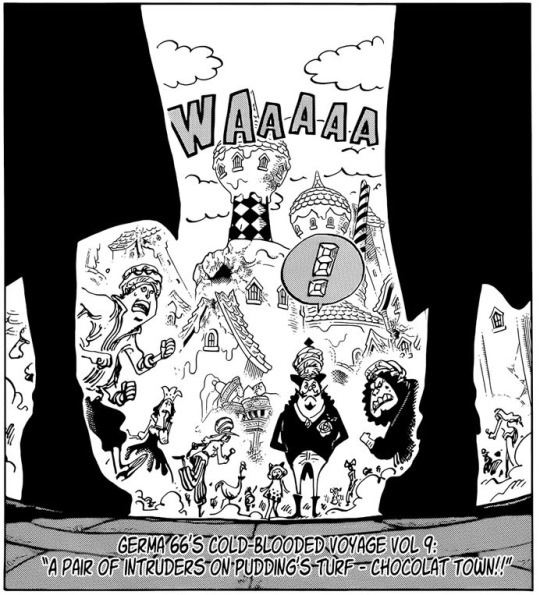
A lot of people are debating who these two could ranging from the more predictable Germa 66 or even Blackbeard pirates - I'll join the prediction line of saying they (kind of?) look like revolutionary? I mean their shoes are definitely not Germa - so my first guess was the blackbeard piraates but the long coats and the silhouette is just giving me revolutionary and i don't know why so don't ask... I guess we'll see.
We start the chapter off with some Kaido vs. Luffy battle continuing, and Zunisha even saying/thinking (addressing it to Joy Boy): This all seems like fate. I can't help but think we should put our faith in this boy.
AND WE ALSO GET THE ICONIC, NEVER AGING, NEVER BORING SAYING
I AM MONKEY D. LUFFY, I WILL-
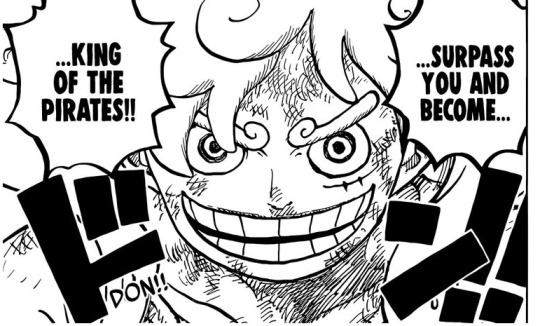
And!! Oda legit told everyone who's talking about reincarnation and whatnot to shut up, everyone debating whether or not this is really Luffy, he is Luffy, and this is his awakening--
Kaido: "We call this an awakening. Your mind and body are finally able to harness the potential of your ability" --->
and this just leaves us questioning; when is Kaido's awakening coming? Because surely he has to do it now...
And we get some more exchanges of blows, and it's always interesting to see how Luffy can bend and control himself and his surroundings now with the awakening... bending himself like this, and even bending Kaido's body when he's punching him to give more effect to the punch
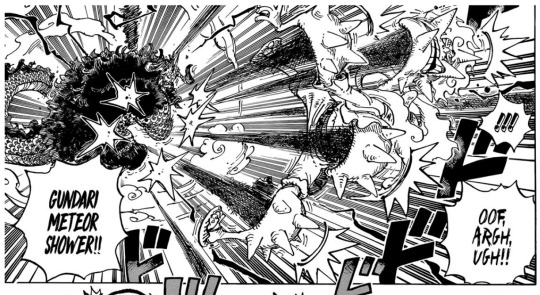

AND I LOVE LOVE LOVE LOVE LOVE LOVE LOVE LOVE whenever we get those "they got me - i got them moments" - We got Kaido saying that everyone's gonna burn to death in the inferno below and Luffy just says
"I left it all to them, I've got nothing to worry about."
AND AGAIN- I just want to repeat that I LOVE this fight, it's just a blend of serious, and really really goofy and I love every part of it
Like c'mon look at this
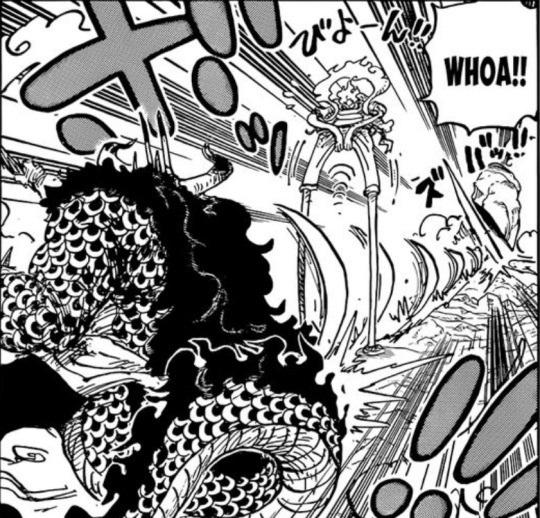
Anyways... so currently everything is on fire in Onigashima. Bepo and crew are complaining about the heat - and just can we just take a moment to discuss how they've done... nothing? like they're yelling for Law to come and save them but they've seriously done nothing and to me, at this point, if Bepo were to ever go Sulong and do something it's more of a "finally" than a "wow" moment. yeah. we'll see.
We've got a little bit more of all of the crew, Nami and Chopper are together, Robin and Brook still running, Usopp trying everything he can to stop the fire to save Kiku and Kinemon, and
Sanji with his cute little rat Chuuji
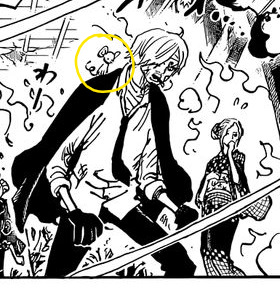
And Franky carrying passed out Zoro who needs urgent care from Chopper (😭😭😭😭😭😭)

ALSO!! We get shown Apoo and Ibi again, and remember we said they could be the samurai prisoners imprisoned with Yamato in the past? That theory still holds up, because why else show them this much...

The connection has to be coming...
And then we finally get to the man of the hour, Raizo!!
The fire is everywhere, no one can escape it and people are going crazy - that's when Oda gives Raizo the opportunity to save everybody on Onigashima, and repay the debt of everyone saving and protecting him -
He teams up with Jinbe to put an end to the fire - and because he has the Maki Maki fruit (scroll scroll) he has the ability to store things and what did he store? The water that Zunisha uses to wash it's back - So he uses Elephant Bath Restoration and paired with Jinbe's Ocean Current Should Throw they manage to send the water flooding everywhere to put out the fire.

Despite my Ninjutsu, I was unable to protect any of them. I can never make up for that failure, but I will never let myself be that helpless again!! Never!!
And now we know that the preparation undertaken in chapter 1041 that Raizo was speaking of has nothing to do with Denjiro, which leaves the question - where the hell is Denjiro?
PS. Can we also talk about how this means that Raizo has had water on hand for this long and refused to save himself from the fire during his fight? He's extremely strong, and extremely underappreciated.
We know Momonosuke still has to create flame clouds, so we're waiting on that, I still hold on the hopes and dreams that Zoro will get up and we'll get answers on whatever happens to the Grim Reaper-
We know Kaido is at his limit now, so predicting the fight will officially end in about 4-5 chapters- when will we get awakening though? Hm.
AND LAST BUT NOT LEAST
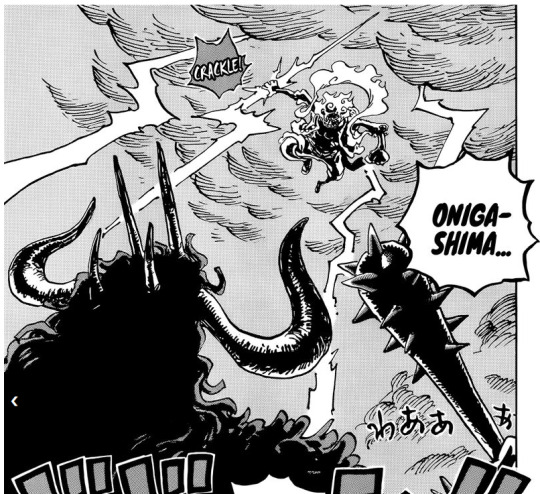
WE GET THIS RANDOM PANEL OF LUFFY HOLDING ON TO A LIGHTNING BOLT? TO STRIKE KAIDO WITH???? HE IS SO COOL
And could this mean we could potentially get a Nami-Luffy Combo someday`?
With that said, break next week. This chapter was great, and I'll see you in two weeks for another cry-
#one piece#op#luffy#opspoilers#spoilers#zoro#wano arc#manga#roronoa zoro#monkey d. luffy#one piece spoilers#manga spoilers#chapter 1046#ch.1046#onepiece1046#one piece 1046#op 1046#kaido#wano kingdom#yonko saga#momonosuke#momo#raizo#usopp#nami#robin#brook#franky#sanji#bepo
68 notes
·
View notes
Text


This is so cuteee.. Chopper leap into Nami's arms and that little mouse on Sanji's shoulder Aww ~☺️ Please reunite with each other soon, I miss you guys together so much.
#one piece#one piece ch.1046#one piece manga#oda eiichiro#eiichiro oda#nami#sanji#sanami#sannami#sanji kun x nami san#sanji x nami
72 notes
·
View notes
Text

one piece fans sleeping tonight knowing there is no break next week and the week after next week
#one piece#op spoilers#op manga spoilers#op#ch 1045 & ch 1046 pending respectively UGH#GOODNIGHT <333
60 notes
·
View notes
Text

Hi, I redrew that one panel from Ch. 1046 bc it was really cute lol
Anyways I'm gonna go obsess over One Piece some more ✌️
#my art#one piece#gear 5 luffy#mugiwara no luffy#monkey d. luffy#sun god luffy#sun god nika#luffy#luffy fanart#one piece fanart#one piece 1046
59 notes
·
View notes
Photo

Kaido’s trying to distract Luffy by mentioning all of the people he has left in the castle but Luffy trusts all of his allies so much that he’s not even worried about what’s happening anywhere else.
7 notes
·
View notes
Text

Oh thank goodness. I thought Akai had yeeted Conan off the roof for a hot sec.
(Ch. 1043-1046: Shogi Player Serial Murder Case)
#Detective Conan#DCMK#Case Closed#Meitantei Conan#akai shuuichi#shuuichi akai#Conan Edogawa#edogawa conan#Chapter 1043-1046#Shogi Player Serial Murder Case#legit the only screenshot i had for this chapter before going back over my notes
93 notes
·
View notes
Photo


Last seen: Vol. 8 ch. 31 (released around 4th September 2015 in Japan) or Second season, episode 9 (released 30th November 2016 in Japan)
It has been 1046 days.
2 notes
·
View notes
Text
【ネタバレ注意】ワンピース1046話すごい展開になってる…
あにまんchまとめ -アニメ漫画ゲーム情報サイト- – 【ネタバレ注意】ワンピース1046話すごい展開になってる…
【ネタバレ注意】ワンピース1046話すごい展開になってる…
Source: 5ちゃんねるまとめのまとめ
View On WordPress
0 notes
Text
Greeks, Chinese, and “Barbarians”: a Chinese perspective (I)

The Great Wall of China. Source: https://www.worldatlas.com/articles/when-was-the-great-wall-of-china-built.html
” Perceptions of the Barbarian in Early Greece and China
Yang Huang
Citation with persistent identifier:
Huang, Yang. “Perceptions of the Barbarian in Early Greece and China.” CHS Research Bulletin 2, no. 1 (2013). http://nrs.harvard.edu/urn-3:hlnc.essay:HuangY.Perceptions_of_the_Barbarian_in_Early_Greece_and_China.2013
§1 Questions of Greek ethnic identity and Greek perceptions of the barbarian continue to stimulate inspiring studies some of which have contended what can be called orthodox theories or models by adopting new perspectives and making use of materials not drawn into the discussions previously. Erich Gruen, for example, argues against scholars who emphasize the role of the barbarian other in shaping ancient Greek ethnic identity. He concludes that Greek (together with Roman and Jewish) attitudes towards other peoples are “far more mixed, nuanced, and complex” than has usually been assumed, and that ethnic identity in antiquity rests less on distinctiveness from the alien than on postulations of “links with, adaptation to, and even incorporation of the alien”.[1] On the other hand, Joseph Skinner has studied the Greek tradition of ethnography from Homer onwards and suggests that discursive elements in that tradition were “constitutive” of Greek identity, and that cultural and ethnic differences did play a part in constructing Greek ethnic identity from a time much earlier than is usually assumed.[2] While the debate is unlikely to be resolved in the foreseeable future in view of the nature of the evidence and the multifaceted perspectives which can be adopted, it might be helpful to bring in a comparative perspective to the discussion. Ancient peoples often described others, especially their enemies, in derogatory terms and even called them barbarians,[3] and perhaps none were more typical than the ancient Greeks and Chinese whose notions in this respect betray certain striking similarity, at least in appearance. While the former clearly differentiated themselves from all others whom they often called “barbaroi”, the latter typically called the surrounding tribes by terms which can be neatly translated as “barbarians”. A comparative analysis on how and in what sense the Greeks and Chinese came to see other people as “barbarians” might inform us about the respective perceptions of the barbarian in either of the two ancient societies.[4] It is the purpose of this paper to look at the early perceptions of the barbarians in early Greece and China in a comparative perspective in the hope that the comparison might shed some more light on the issues involved. It will outline the early Chinese perceptions of other peoples down to the third century BC before attempting some preliminary comparative analysis.
§2 The ancient Chinese used a number of words which are conveniently translated as “barbarians”. The two words most commonly used are the yi 夷and man 蠻. The former is found in the earliest Chinese written records, i.e. the Oracle Bone Inscriptions of the late Shang period (Shang, c.1554-c.1046 BC; Oracle Bone Inscriptions, 14th-11th centuries BC), in which the largest group of relevant texts refers to the Shang “campaigns into the yi region”[5] as in the example “divination on the day of xinzhi (the eighteenth day): is it good for ? to campaign into the yi region next month? In the eighth month.”[6] The pictogram for yi is , believed to denote literally a dead body, i.e. the killed enemy.[7] A variant of the pictogram, , also appears in the Oracle Bone Inscriptions. It is adopted in the bronze inscriptions of a slightly later period which also used another sign, namely , to express the same idea. The latter literally denotes a man bound by a rope, i.e. a prisoner or slave. The word man is first found in the bronze inscriptions of Western Zhou (c.1046-771 BC) and the sign is a compound ideogram in the form of , with the lower component taken to mean “snake” in ancient Chinese. Two other words were also used to denote groups of people other than the Chinese, namely rong 戎 and di 狄, with the former first appearing in the Oracle Bone Inscriptions and denoting “warlike people” and the latter first appearing in the Bronze inscriptions and denoting “people with hounds”.
§3 Apart from the yi, the Oracle Bone Inscriptions also record a number of other regions that the Shang force habitually campaigned into, especially the qiang羌 region.[8] This fact suggests that the term yi probably did not carry the sense of “barbarian”. Rather it simply denoted one of the many tribes or regions that were the target of the Shang military campaigns. In the bronze inscriptions of the Western Zhou period the yi people were yet again targets of repeated campaigns. However, they do not seem to have been always tied to a particular region any more. Instead they now began to be associated more often with different regions or directions such as “Eastern yi”, “Southern yi”, “yi of the Huai region” or “yi of the Southern Huai region”. A bronze inscription of the very early Western Zhou period reads, “The Duke of Zhou personally led a campaign against the eastern yi…”,[9] and a late Western Zhou bronze inscription records a certain chieftain leading “the yi of Southern Huai and the Eastern yi to campaign extensively against the eastern and the southern regions (of Zhou)”.[10] There are also records of other yi such as the Xi Men yi, the Xiong yi, and the Jing yi.[11] The yi thus had become a common name for a number of tribes hostile to the Zhou regime.[12] Similarly, when the word man first appeared in the bronze inscriptions of the Western Zhou period, it denoted regions or directions that were targets of Zhou campaigns.[13] The inscriptions show that on different occasions it is used to denote different groups in the north, west, and south.[14] A bronze inscription also includes the words bai man (literally “the hundred man”) which also appear in the Shijing, or Book of Poetry, a collection of poems and the earliest extant literary work in China.[15] The man, therefore, also seems to have denoted different tribes in different regions and directions.
§4 We see, therefore, that at the beginning the yi might haven been certain particular tribe or group of people that was neighboring the Shang. However, by the Western Zhou period the yi as well as the man had come to denote different groups of people in widely different regions and directions. In either case they were recorded mostly because of hostilities between them and the Shang and Western Zhou regimes. By the time of the late Spring and Autumn Period and the Warring States Period, that is, from the fifth to the third centuries BC, when the earliest extant literary records appeared, the Chinese seem to have distinguished themselves clearly from the various yi, man, rong and di. They called themselves Xia or Huaxia after what was believed to be the earliest political entity of the Chinese, the Xia (c. 2000-1554 BC), which predated and was conquered by the Shang, and generally considered the barbarians enemies of the Chinese. The Shangshu, or Book of Documents, which claims to record sayings and speeches of rulers and kings of the three dynasties of Xia, Shang, Western Zhou and beyond, recounts a speech attributed to the legendary king Shun who was supposed to have ruled before the Xia dynasty. The sage king said to his minister Gao Yao:
Gao-Yao, the manyi disrupt the Xia. There are robbers, murderers, insurgents, and traitors. It is yours, as the Minister of Crime, to use the five punishments to deal with their offences.[16] (trans. Legge)
§5 It is noteworthy that now the terms man and yi are combined to indicate the barbarians, apparently in general terms. As a matter of fact, such combinations as manyi, rongdi or yidi were regularly taken up in the texts of the period. The Zuozhuan, the first major historical narrative in ancient China which probably dates back to the fifth and fourth centuries BC, records a famous instance in which Guan Zhong, a famous minister and reformer of the state of Qi, persuaded Duke Huan in 661 BC to help the state of Xing which was under attack by the di barbarians with the following words, “The rongdi are wolves and jackals who can not be satiated; the several Xia are kin who can not be abandoned.”[17] Here the combination of rongdi is used to denote the di barbarians. On another occasion the same combination is used to denote the rong barbarians.[18] The beast simile in the passage is also noteworthy as authors of the period typically compare barbarians to “birds and beasts”.[19] Occasionally, those who lived around the Chinese world were even described as part humans and part animals. In the Shanhaijing, or Book of Mountains and Seas, a mythical and geographical work, the bulk of which was probably composed in the Warring States period, various animals with human parts or humans with animal elements in the regions surrounding the Chinese world are recorded.[20]
§6 The barbarians, however, were compared to “birds and beasts” predominantly not because of their different natural appearances, but because of their different customs. In the ”Royal Regulations” of the Liji (Book of Rituals), a work which is believed to contain segments from the time of Confucius but compiled much later, the king is reminded that he should recognize that inhabitants of different geographical settings have different customs. Then the different tribes of the man, yi, rong and di are neatly allocated to the four directions of South, East, West and North, and their customs that differ from the Chinese are expounded:
The Zhongguo (Middle Kingdom) and the rongyi, the peoples in these five regions all had their several natures, which could not be made to alter. Those in the East were called yi who had their hair unbound and their bodies tattooed, and they ate their food uncooked; those in the South were called man who had their foreheads tattooed and their feet turned in towards each other, and they ate their food uncooked; those in the West were called rong who had their hair unbound and wore hides, and they did not eat grain; those in the North were called di who wore feathers and dwelt in caves, and they did not eat grain. The people of the Middle Kingdom, and of those yi, man, rong, and di, all had their dwellings, where they lived at ease; their flavors which they preferred; the clothes suitable for them; their proper implements for use; and their vessels which they prepared in abundance. In those five regions, the languages of the people were not mutually intelligible, and their likings and desires were different. To make what was in their minds apprehended, and to communicate their likings and desires, (there were officers) – in the east, called transmitters; in the south, representationists; in the west, didi; and in the north, interpreters.[21] (trans. Legge with some revision)
§7 At first glance the passage seems to report in a matter of fact tone the differences of the peoples in disparate regions, and the words man, yi, rong and di do not seem to be used with apparent derogatory connotations. Yet, the contrast between the Chinese and the other tribes is clear enough right from the first sentence, and the customs of these tribes that are stressed actually serve to highlight that contrast as the Chinese in the Middle Kingdom considered agriculture as the basis, and dressing and eating properly as an essential part of the rites, for the civilized way of life. The passage is important in that it laid out a Chinese political geography which included the barbarians, but allocated each tribe of them to the four directions. The dichotomy of the Chinese at the center and barbarians at the periphery had thus become a fundamental component of the Chinese perception of the Chinese political order, the “All Under Heaven” (tianxia). The Shangshu includes a political treatise on the administration of the legendary king Yu from a geographical perspective. In it the Chinese political order is further elaborated as five concentric zones surrounding in turn the royal capital in the center with the two outer zones reserved for the yi, man and exiles.[22] This ideological construct seemed to be widely accepted as it was mentioned in several other sources.[23] In the Guoyu (Discourses of the States) the Western Zhou political system is also described as consisting of the Five Zones with the manyi and rongdi occupying the last two outlying zones.[24] Similar accounts are also seen in the Zhouli (Rites of the Zhou) and other texts.[25]
§8 The barbarians, then, were not only differentiated from the Chinese, they were also thought to be ruled over by the Chinese. To trace the origin of this political ideology, we need to go back to earlier periods of Chinese history. The first Chinese kingdoms, the Xia, the Shang, and the Zhou rose successively along the middle and lower reaches of the Yellow River valley amid various other tribes or peoples. In the course of the Shang and Zhou expansion they conquered many of these peoples and ruled over them. This formed the historical foundation for the idea of the “All Under Heaven”, a political ideology that saw the ruling Chinese at the center of a state which in concept had the unlimited potential of expanding into surrounding territories of the different barbarians and assimilating them. It is believed that by the time of the Western Zhou period the concept of “All Under Heaven” had been firmly established.[26] Later political theorists had further elaborated this political notion by creating a model whereby the all important ruler, the “Son of Heaven”, was surrounded by five zones stretching into barbarian lands, and which formulated the configuration of the “barbarians of the four quarters” with the yi, man, rong and di tied to the four directions of East, South, West and North.
§9 Thus the barbarians seem to have played a vital role in the ideological construction of the Chinese political order which at the same time embodied the Chinese notion of the world order, with the Chinese at the center of the world, its rulers alone enjoying the Mandate of Heaven to rule over all. This political ideology was further justified and reinforced by Confucianism which emerged during the late Spring and Autumn period and which took the Western Zhou as a model of civilized society. It envisaged an ideal social, political and moral order based on humaneness and the observance of proper rites (li). For Confucius, observing the proper rites was the hallmark of a civilized society and the barbarians were inferior precisely because they did not adopt the rites. It is in this sense that Confucius says, “Even if the yidi have kings, they are still inferior to the several Xia when they do not have kings.”[27] It is also in this sense that commentators in the late Spring and Autumn period and in the Warring States period stress that the civilized Chinese states should be protected against the onslaught of barbarians. Hence Confucius praised Guan Zhong, for steering a policy of warding off the barbarians: “Were it not for Guan Zhong”, says Confucius, “we should now be wearing our hair loose and folding our ropes to the left”[28], meaning that the Chinese would have been forced to adopt barbarian customs. The second great Confucian master Mencius (372-289 BC) also firmly believed in the superiority of Chinese culture when he said, “I have heard of transforming the yi by the Xia, but never of transforming the Xia by the yi.”[29] Yet, it was Mencius who developed an idea that was already hinted at by Confucius, namely, that barbarians can become civilized by adopting proper ritual norms of the Chinese.[30] As a matter of fact, commentators of the Warring State period had witnessed such transformation since the southeastern states of Wu and Yue, which was seen as barbarian in origin, and the northern state of Zhongshan established by the di, had adopted the Zhou ritual norms and been integrated into the Chinese world by the Warring States period, and were no longer treated as a barbarian states since then.[31] On the other hand, while fully subscribing to the cultural demarcation between the Chinese and the barbarians, later Confucian commentators also believed that when Confucius compiled the Chunqiu, or Spring and Autumn Annals, he upheld the idea that even the Chinese would become barbarians if they did not observe the rites properly. In an early Han commentary of the Chunqiu, the Gongyang Commentary, the author sharply criticizes the Middle States as “new barbarians” on the ground that they did not respect the status of the Zhou king and thus disrespected the proper ritual norms.[32] Commenting on Confucius’ project of compiling the Chunqiu, the great scholar Han Yu, who lived in the late eighth and early ninth centuries, says that its purpose is to “treat the dukes and lords who adopt barbarian rituals as barbarians, and to treat those who adopt Chinese rituals as Chinese”.[33]
§10 From this brief treatment we see that a dichotomy of Chinese and barbarians was perhaps already in place at the latest in the Western Zhou period, if not before, in the sense that the Zhou people were often at war with the various barbarians; that they left the impression in their records that the barbarians were invariably targets of campaigns and conquest; that they believed that they were entitled to rule over them. By the time we possess the earliest extant literary works, that is, from the fifth to the third centuries BC, the barbarians were seen as clearly inferior, possessing uncivilized customs and not observing proper rites. Nevertheless, the fundamental differences between the Chinese and barbarians were seen as those of customs and rites, not those of race or ethnicity. Hence barbarians could become Chinese by adopting Chinese customs and rites. On the other hand, in the Confucian view which was to dominate Chinese intellectual and political history, those Chinese who failed to observe the proper rites should be treated as barbarians. Hence the statuses of the Chinese and barbarians were transformable, as has been pointed out by Yuri Pines.[34] On the basis of this, the Chinese political ideology was further rationalized in that China was seen as the center of the civilized world, surrounded by barbarians in the four quarters who invariably bore the same names, but that the Central Kingdom was capable of ever expanding and assimilating these barbarians into the civilized universe.
§11 Early Chinese perceptions of the barbarian might be suggestive for the study of early Greek attitudes to the barbarian in a number of ways. What can now be called the traditional view holds that the distinction between Greeks and barbarians did not become apparent and that the barbarian did not play a significant role in Greek self-identification before the Persian-Greek encounters as advanced by Edith Hall and Jonathan Hall among others.[35] This view has been criticized for falling into the traditional narrative trap which distinguishes phases of the relationship between Greeks and other people, with distinct features in each phase, along with the traditional periodization of Greek history into archaic, classical and Hellenistic periods.[36] Its arguments are essentially based on linguistic and textual evidence. It is true that the word “barbaros” only appears once in the Homeric poems in a compound form (barbarophōnos, Il. 2. 867) and is not found henceforth until the late sixth and early fifth centuries BC when it reappears in the works of Anacreon (fr. S313b, Page SLG) and Heraclitus (fr. 22 B 107 DK), but this may have resulted from the nature of our evidence. As a matter of fact, documentation about other peoples in archaic Greece is scanty and fragmentary, as is also the case in early China before the fifth century BC. Yet the Chinese evidence allows us to draw a somewhat clearer picture of the process by which encounters and hostilities between Chinese and other peoples in the course of early Chinese expansion had gradually turned the latter indiscriminately into barbarians. The words later used for “barbarians” originally designated some specific foreign tribes in the Shang records, but had come to denote various groups of people in different regions surrounding the Chinese regime in the Western Zhou period, implying that a Chinese – barbarian dichotomy was already perceived. More importantly the Zhou people formulated the idea of their political order very much on the basis of an opposition between themselves and the barbarians. It seems that from early on the barbarian had already become an important element in the Chinese self-identification. By the time when we have the earliest extant literary works, the general polarization of the Chinese and barbarians seems to have already been firmed established. The barbarians were now seen as clearly inferior culturally to the Chinese who saw themselves as the center of the civilized world. In other words, in the Chinese case perceptions of the barbarian were an ongoing process—an evolving continuum which culminated in the self – other polarity in the end. Ignoring or failing to give full weight to the early part of that process would stop short of bringing out full implications that such perceptions entailed or even lead to distorted pictures.[37]
§12 The Chinese example, of course, by no means warrants a parallel development in early Greece, but it may prompt us to pay due attention to the role that encounters with other peoples in early Greek expansion might have played in Greek perceptions of the barbarian. It would be very hard to imagine that the many encounters between Greeks and other peoples during the period of archaic Greek colonization did not make Greek minds ponder the differences (and sometimes enmity) between them and others. [LK1] Indeed Irad Malkin has suggested that networking in the colonization of the Archaic period was a way of forging Greek identity,[38] and it would be hard to imagine that the other side of the same process, the drawing of boundaries between the networking Greeks and others, did not play a part in forging that identity. Malkin himself admits that the Hellênion at Naukratis (Herodotus, 2. 178) with the dedications to “the gods of the Hellenes” (τοῖς θεοῖς τῶν Ἑλλήνων) “implies a self-aware religious convergence. It was a Greek convergence that could happen only within a ‘colonial’ context”.[39] Earlier Carla Antonaccio’s analysis of ethnicity in Sicily had come to a similar conclusion.[40] Moreover, the Homeric poems which are of a Panhellenic nature both in terms of composition and in terms of proliferation as suggested by Gregory Nagy[41] must have already made the Greeks aware that they were opposed not only to the Trojans, but also to an array of peoples in the East as attested in the Catalogue of Ships. Hilary Mackie has shown that the Iliad in fact differentiates Greek and Trojan culture by constructing two languages “that differ in style, civic function, genre, and linguistic orientation”.[42] On a closer scrutiny even the supposedly free-from-prejudice wording of “barbarian-speaking Carians” (Καρῶν βαρβαροφώνων) may not have been free of prejudice if understood within the Homeric context.[43] In a remarkable inquiry into Greek voyages, François Hartog discusses how Odysseus as a “frontier-man” “marks out frontiers” through his travels and adventures. He thus concludes that the Odyssey “provides the basis for the Greeks’ vision of themselves and of others”.[44] Indeed stories of Odysseus’ imagined adventures and Greek settlers’ travels might have interplayed in mapping out the boundaries of the Greek world. Both Carol Dougherty and Irak Malkin have illuminated the ways in which the Odyssey and Greek colonization interacted in conceptualizing Greek encounters with others and delineating the contours of Greek identity.[45] More recently in an intriguing study, Joseph Skinner has made use of material evidence so far not drawn into the discussion to argue that Greek ethnographical interest and discourses on cultural identity are ‘an ongoing continuum’ from Homer to Herodotus.[46]
§13 In the light of the foregoing discussions I suggest that an alternative approach to Greek perceptions of the barbarian and self-identity is possible–an approach that does not narrowly focus on linguistic usage and genealogies, or on decisive moments for a clear articulation of “oppositional” self-identification, but is broad enough to also take into consideration the impact of Greek expansion in the form of trade and colonization and of the Homeric poems on the Greek imagination of themselves and others from the early Archaic period onwards. Seen in this way Greek perceptions of the barbarian, like those of the Chinese, might well be an evolving process, “an ongoing continuum” in the words of Joseph Skinner, from the early Archaic period onwards that leads to the articulation of, and discourses on, the Greek – barbarian polarity. The evolving notions of the barbarian other might have already played an important role in the formative period of Greek as well as of Chinese culture in that they helped to set up the foundations on which the political and cultural systems of the two societies were to develop. Thus it will not do to suggest that the notions of the barbarian represented no more than mere human prejudices and that only a faction of people in ancient Greece and China held up those prejudices. The notions of the barbarian were perhaps fundamental strategies by which these two ancient societies forged their cultural traditions.”
0 notes
Text
Standard Electric Mini Food Choppers for You
Best Food Choppers in Pakistan 2021:
Hmm, a mini food chopper is basically a tiny food processor. This small kitchen appliance could perform an important role in your kitchen by helping you as a great companion each day. Also, from chopping a few segments of pepper, garlic, and ginger to cutting vegetables into small fragments, all cutting work could be done with a mini food chopper and minimum effort. Believe us that adding an appliance like that in your kitchen space could be the smartest idea for you that you won’t want to miss

WESTPOINT CHOPPER 1046
Westpoint Food Chopper 2044
Philips Food Chopper HR2056
KENWOOD CHOPPER CH250
Kenwood Multi Chopper With Blender (CH-505)
Blog url: https://www.alfatah.com.pk/standard-electric-mini-food-choppers-for-you/
Website: https://www.alfatah.com.pk/
Email: [email protected]
0 notes

